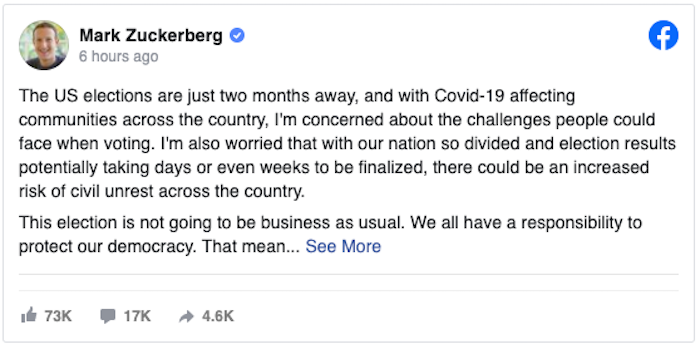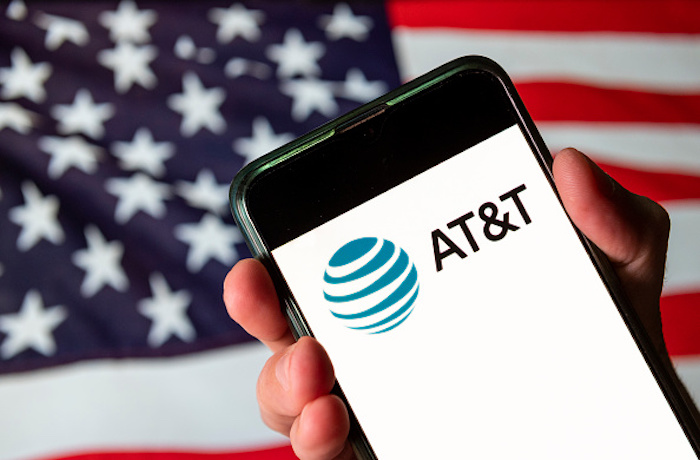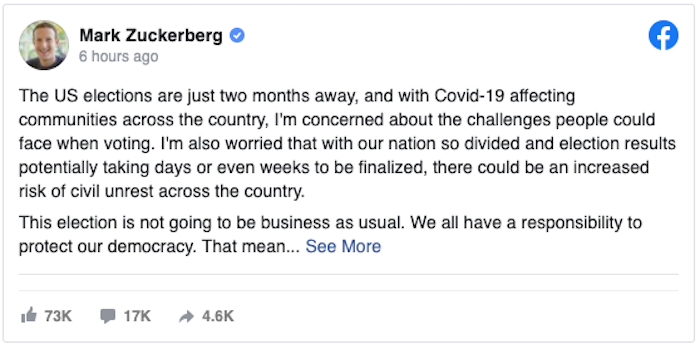Facebook limits election advertising

What’s new: Facebook has announced it will restrict ads about “social issues, elections, or politics” between October 27 and November 3.
Why this matters: Tech companies are trying to combat “fake news,” foreign influence operations, and other efforts to mislead US voters — all of which are likely to flood social media before Election Day.
Key points: According to an official Facebook post, the company will take the following actions:
-
It “will not accept new political ads in the week before the election.”
-
It will “remove posts that claim that people will get COVID-19 if they take part in voting, and we’ll attach a link to authoritative information about the coronavirus to posts that might use COVID-19 to discourage voting.”
-
It will “attach an informational label to content that seeks to delegitimize the outcome of the election or discuss the legitimacy of voting methods, for example, by claiming that lawful methods of voting will lead to fraud.”
-
“If any candidate or campaign tries to declare victory before the final results are in, we’ll add a label to their posts directing people to the official results from Reuters and the National Election Pool.”
Separate, but relatedly, Zuckerberg has donated $300 million of his personal wealth to shoring up election infrastructure.
What we’re thinking: No one is going to like this; but, it’s probably a smart move. It’s in the company’s interest to limit its culpability in spreading misinformation or in suppressing voter turnout — and you can’t be blamed for spreading something you never allowed on the platform to begin with. That said, many of those who would use Facebook to promote their preferred political candidate or policy issue will invariably feel like they’re being disadvantaged by the ban. Even more, any perception of uneven application of these actions will reinforce broad public perceptions of online bias.
Bottom line: Yuck.
AT&T chimes in on §230

What’s new: AT&T’s EVP of Regulatory and State External Affairs published a blog post calling on the FCC to change §230 of the Communications Decency Act — the tech industry’s longstanding legal shield against content liability.
Why this matters: AT&T is a huge player in telecommunications and entertainment (they bought Time Warner in 2016) and they often push against Silicon Valley on issues of “neutrality” and liability.
Key points:
-
The FCC is taking public comments on potential new modifications to §230, after President Trump issued an Executive Order in May on “Preventing Online Censorship.”
-
AT&T says the FCC should narrow the protections of §230 and that companies like Amazon, Apple, Facebook, and Google should be more transparent.
-
These liability protections “would ultimately be wielded by the largest and most powerful companies in the world as a shield not just from unfair and frivolous lawsuits,” says the company blog post, “but from what many consider to be every day responsibilities.”
What we’re thinking: §230 is a complicated and consequential issue that touches on corporate responsibility, freedom of speech, property rights, and a host of other critical factors. While it is certainly true that AT&T has vested interests in constraining other tech titans, their contribution to the FCC’s thinking shouldn’t be dismissed. There is a lot at stake and the various members of the tech industry are starting to choose sides.
IBM builds drug lab in the cloud

What’s new: IBM is using AI, robots, and cloud computing for its new RoboRXN chemistry lab, according to MIT Technology Review.
Why this matters: RoboRXN allows researchers to design and synthesize new chemical compounds remotely.
Key points:
-
Scientists login to a webpage where they draw the frame of the molecular combination they want to build.
-
An AI then takes that drawing and predicts what ingredients are necessary and in what combinations.
-
This recipe is then sent to robots in a remote lab to build, and then the platform generates a report with results of the experiment.
What we’re thinking: A huge part of the delay and expense of bringing new drugs to market (typically about 10 years and $10 million) comes from trial and error experiments with different chemical compounds. The promise of the platforms like RoboRXN is that they will dramatically reduce the time and resources needed to realize new treatments.
Amazon gets its wings

What’s new: The FAA has cleared Amazon to operate its fleet of “Prime Air” delivery drones.
Why this matters: The age of consumer drone delivery is here.
Key points:
-
The ecommerce giant is now allowed to “safely and efficiently deliver packages to customers,” under Part 135 of FAA regulations.
-
Specifically, Amazon can now carry packages on small drones “beyond the visual line of sight” of the pilot.
-
The Bezos behemoth joins UPS and Alphabet-owned Wing in gaining this approval.
What we’re thinking: In the not-too-distant future, you’ll be able to order a flat tire repair kit and have it delivered to you on the side of the road.
Almost 30K printers “ethically hacked”

What’s new: A team of researchers and ethical hackers from CyberNews intentionally hacked nearly 30,000 printers to alert owners of their at-risk devices.
Why this matters: Out of the 50,000 printers that were targeted, roughly 28,000 printed a message from the hackers. CyberNews highlights that their hit rate of hijacking was 56%, and that this number “speaks volumes about the general lack of protection of networked devices worldwide.”
Key points:
-
The attackers created a script, ironically a PDF guide on printer security, to cycle through their list of at-risk printers without gaining access to data or files.
-
This illustrates that ill-intended hackers can use printers to gain access to networks as the first step in a more sophisticated attack.
-
The culprits used the Shodan search engine to locate vulnerable printers.
-
Shodan is used by security researchers and cyber criminals to identify vulnerable surveillance cameras, security systems, and other devices.
-
In 2018, a hacker hijacked up to 50,000 printers and forced them to print documents about a controversial YouTuber.
**Special thanks to CTP’s Annelise Butler for contributing this report.**







Please note that we at The Dispatch hold ourselves, our work, and our commenters to a higher standard than other places on the internet. We welcome comments that foster genuine debate or discussion—including comments critical of us or our work—but responses that include ad hominem attacks on fellow Dispatch members or are intended to stoke fear and anger may be moderated.
With your membership, you only have the ability to comment on The Morning Dispatch articles. Consider upgrading to join the conversation everywhere.